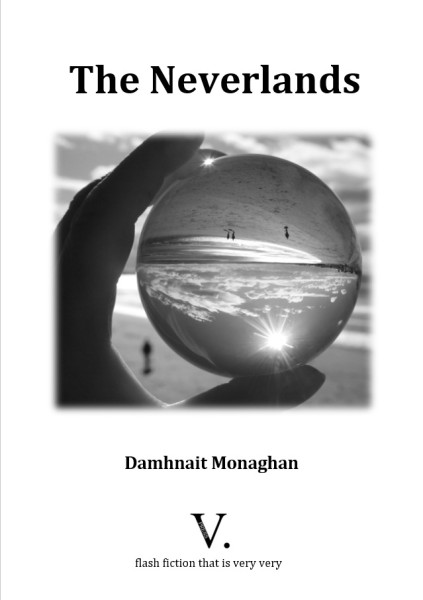
by Frannie McMillan
Damhnait Monaghan’s The Neverlands (V. Press, April 2019), described by Kathy Fish as a “mosaic of microfictions,” alternates between the perspective of a young Irish girl, Nuala O’Riordan, and her mother, known only as Mammy. Nuala’s life is marked by a series of traumas: bearing witness to the disintegration of her parents’ marriage, losing a parent and then a grandparent. Her mother’s life features an unfaithful, alcoholic husband, repeated miscarriages, feelings of maternal inadequacy, depression, losing her father, and having her child taken from her. Monaghan draws these characters and their hardscrabble existence with a skilled hand, taking care to grant readers intermittent moments of dark humor and optimism. This slim pamphlet contains unblinking truths about families, motherhood, childhood, poverty, and manages to make readers feel as though they’ve read an epic novel about Nuala and Mammy in just a handful of words.
In “It Is Written” Monaghan lays out the particulars of the story’s primary conflict in a tidy little paragraph: Nuala’s unfailing love for her irresponsible, fun-loving father, and her struggle to understand her mother. Written from Nuala’s point of view, this opening story reveals the tender nature of Nuala, who “wants to fix things even though Mammy says there’s no fixing Da.” Readers sense the tension between Mammy and Da when Nuala wonders if her mother is the one who painted offensive graffiti calling her Da a “gobshite.” We’re also introduced to Grandad, Nuala’s confidante and Mammy’s father. Grandad is sympathetic to Seamus O’Riordan and tells Nuala “poor aul’ Da’s a lost soul” as he hands her paint and a brush to cover the harsh words.
Nuala isn’t without her own childish secrets and tiny acts of rebellion. Within the first few sentences of “It Is Written,” Nuala defies her mother by walking along the sea wall. In “Slaying Her Demons,” Nuala merrily skips home from school, “practically floating” because she was praised by Sister Angelique for a story she wrote about dragons. Meanwhile, her childhood rival, Aoife O’Leary, stood in a corner as punishment for saying that Nuala’s story was stupid. Nuala was equally gleeful about both events. In “Thou Shalt Not Covet,” readers learn that Nuala apparently found Sister Angelique’s cross, but instead of turning it in, she keeps it.
The first seven stories are from Nuala’s point of view, but instead of making her an unreliable child-narrator, Monaghan imbues Nuala with a wisdom beyond her years. For example, near the end of the first story, Nuala intentionally slows her gait so that her elderly Grandad “thinks he’s leading the way.” Nuala is aware of her mother’s many miscarriages and in “Limbo” she acknowledges that “Mammy doesn’t like to talk about them but Nuala prays for them every night,” showing both Nuala’s compassion for her lost siblings and her wounded mother. In “Thou Shalt Not Covet,” Nuala observes that Sister Angelique rubs a gold cross between her fingers “when she thinks no one’s looking.”
In the last story before the narrative shifts for the first time to Mammy’s perspective, Nuala makes keen observations about both parents, noting that “Da gets his wages and goes to the pub” while her mother “polishes her arguments.” Nuala accurately predicts that the night will end in turmoil, so she goes to bed and “pretends to live somewhere else.” In the segment following Mammy’s first stories, in a piece called “Dutch Courage,” which takes places after Nuala’s first Holy Communion, Da appears drunk at the gates of her school. She notices he is missing more teeth, and wonders “why does he have to be drunk to say anything good” as she pinches her wrist to keep herself from crying. The title story emerges from Nuala misunderstanding Sister Angelique’s reference to the Netherlands in “Dutch Courage.” When Nuala goes to the library, she asks for a book about the Neverlands, and the librarian hands her Peter Pan. Monaghan deftly circles back to the very first piece in the collection when Nuala finishes Peter Pan and realizes “Grandad is wrong. Da is not a lost soul, he’s a Lost Boy.”
This realization marks a turning point in Nuala’s story as she begins feeling pity for her father while still struggling to connect with her mother. This is fully realized in “The Wages of Sin” when Nuala is sent by her mother to the pub to retrieve some of his pay before he spends it all on alcohol. Nuala discovers that her father has a mistress, who is now pregnant. Her father, drunk, of course, wraps her in a celebratory hug but “swears and tries to grab her arm” when Nuala sneaks the money from his pocket and runs home. In “Come Out, Come Out, Wherever You Are,” Nuala is forced to accompany Mammy as she confronts Seamus about his affair. This is heavy work for a child, but Nuala, stoic as ever, kicks the door and thinks “I am not a bloody child.” Clearly, Nuala comprehends the heft of this moment as she watches her mother fall apart in this scene. She is leaving innocence behind, and she knows it. Readers move closer to Mammy as her voice takes over, switching from only one or two intertwined stories to a section of seven before the collection gives Nuala and Mammy’s voices equal play.
Mammy’s voice is delivered in second person, and is first heard in “Habits,” where already it is ragged “after all those years on your knees, pleading with Holy Mary to help you keep a baby.” The choice to deliver Mammy’s part in second person places the reader in her shoes, creates a hard contrast with Nuala’s voice, and mirrors the distance Mammy struggles to cover between herself and Nuala. This intentional difference in narration also ensures that readers don’t default to sympathy for Nuala and frustration with Mammy’s shortcomings as a mother. For example, in this first glimpse of Mammy’s inner self, readers learn that she spends each afternoon “thinking today’s the day you’ll greet her [Nuala] with the years of hugs you’ve denied her,” but when Nuala begins talking about wanting a prayer corner in her bedroom and Mammy tells her “its past time for prayers in this family,” Nuala’s joy recedes, and Mammy admits “your arms are that sore from wanting to hold her, but your feet are rooted to the ground.” Right away, Mammy’s heartache is clear. She pines for love, for the ability to show affection to Nuala. In “Star-crossed Lovers,” readers get just enough backstory about her “dead poetic” love affair with Seamus to develop a deep, abiding sympathy for this broken woman who married at sixteen. Slowly, Monaghan feeds readers bits of information about Mammy’s sad life. In “Grandad,” we learn that Mammy’s mother died during her birth. Later, in “By the Light of the Moon,” a constable comes to deliver the news of Seamus’s drowning, and she watches in pain as the man “hugs her like you’ve never been able.” In the next story, “Mea Maxima Culpa,” Seamus’s mother comes to take Nuala away, saying “you’re not fit to raise her.” The pace at which Mammy’s life falls apart quickens, and in “Vigil” she loses her father. The saving grace here is that Nuala is in Dublin with Seamus’s mother, so readers are spared seeing that heartbreak through her eyes. Mammy is emotionally numb enough that these stark facts are revealed without much fanfare.
Finally, though, her luck turns in “The Solicitor,” where she inherits some money from her father’s estate. And again, in “Two for Sorrow,” when her long lost sister, Sheila, sends her airfare and asks her to come to Canada to live with her. Although Mammy and Nuala’s relationship is strained, one of the high points in the collection is when Mammy arrives to reclaim Nuala from her mother-in-law in Dublin in “Doors Are Opening.” Already, Mammy is changing, and “there’s a lightness about you that you’d nearly forgotten.” She is coming back to herself; her spirit is growing stronger with the promise of a new beginning. This is as much a commentary on the psychological impact of poverty as it is a story about mothers and daughters. It isn’t until Mammy is in a stronger financial position that she is able to overcome her depression (at least partially) and get her daughter back.
In “Taking Flight,” Nuala, observant as ever, savors the moment Mammy makes a joke and winks at her. During their flight to Canada, Mammy falls asleep with her head on Nuala’s shoulder. Nuala “strokes Mammy’s cheek then kisses her own fingers”. In “Tea and Laughter,” Monaghan returns Mammy to Nuala in a slow, tender way. Nuala hears her mother laugh in a new way, “like fairy whispers.” The final story, “Snow, Falling,” places Mammy and Nuala in front of Sheila’s house, their long journey at an end. Nuala sees snow for the first time, and her delight, coupled with the relief of this fresh start, makes Mammy realize “it’s time to leave the heartache and pain behind and love this girl hard.” She throws herself down into the snow next to Nuala, finally letting go of that heartache and pain and allowing herself the full measure of love.
_______________________________________
 Frannie McMillan’s poetry has appeared in The Coachella Review, K’in Literary Journal, The Indianapolis Review, and others. She is currently at work on her first chapbook, You Ain’t By Yourself. By day, she connects young people with books as a secondary librarian in Richmond, Virginia. You can find her on Twitter @franniemaq.
Frannie McMillan’s poetry has appeared in The Coachella Review, K’in Literary Journal, The Indianapolis Review, and others. She is currently at work on her first chapbook, You Ain’t By Yourself. By day, she connects young people with books as a secondary librarian in Richmond, Virginia. You can find her on Twitter @franniemaq.

 The SmokeLong Grand Micro Contest (The Mikey) is now an annual competition celebrating and compensating the best micro fiction and nonfiction online.
The SmokeLong Grand Micro Contest (The Mikey) is now an annual competition celebrating and compensating the best micro fiction and nonfiction online.